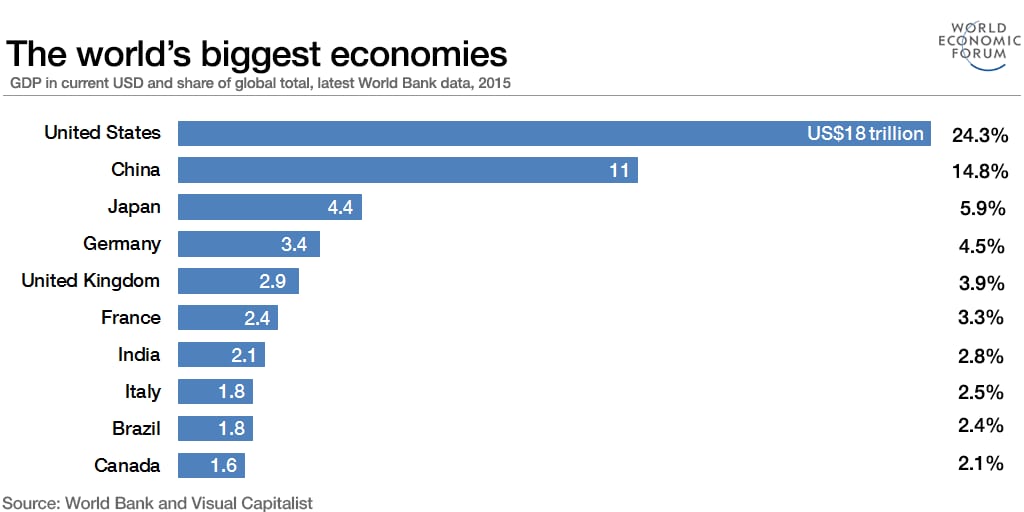The world’s 10 biggest economies in 2017

The US dominates, but other economies are catching up
Image: REUTERS/Mike Hutchings
The economy of the United States is the largest in the world. At $18 trillion, it represents a quarter share of the global economy (24.3%), according to the latest World Bank figures.

Image: World Bank
China follows, with $11 trillion, or 14.8% of the world economy. Japan is in third place with an economy of $4.4 trillion, which represents almost 6% of the world economy.
European countries take the next three places on the list: Germany in fourth position, with a $3.3 trillion economy; the United Kingdom in fifth with $2.9 trillion; and France in sixth with $2.4 trillion.
India is in seventh place with $2 trillion, and Italy in eighth with an economy of over $1.8 trillion.
Ninth place goes to Brazil, with an almost $1.8 trillion economy.
And in 10th is Canada, with an economy of over $1.5 trillion.
The economy of the United States is larger than the combined economies of numbers three to 10 on the list.

Fastest-growing economy
The US may not dominate for much longer, however.
Although China trails the US by $7 trillion, it’s catching up. China’s economy grew by 6.7% in 2016, compared with America’s 1.6%, according to the IMF.
China has also overtaken India as the fastest-growing large economy. The IMF’s World Economic Outlook estimated China’s economy grew at 6.7% in 2016, compared with India’s 6.6%.
Brazil’s economy has contracted in the last year by 3.5%, the only one in the top 10 to do so.
The chart above shows the world’s 40 biggest economies individually, but grouped by colour into continents.
The Asian bloc clearly has a larger share than anywhere else, representing just over a third (33.84%) of global GDP. That’s compared to North America, which represents just over a quarter, at 27.95%.
Europe comes third with just over one-fifth of global GDP (21.37%).
Together, these three blocs generate more than four-fifths (83.16%) of the world’s total output.
The biggest economies in 2050
A new study by PricewaterhouseCooper says that China will be in first place by 2050, because emerging economies will continue to grow faster than advanced ones.
India will rank second, the US will be third, and fourth place is expected to go to Indonesia.
The UK could be down to 10th place by 2050, while France could be out of the top 10 and Italy out of the top 20 as they are overtaken by faster-growing emerging economies such as Mexico, Turkey and Vietnam.
The report also says that the world economy could more than double in size by 2050, far outstripping population growth, due to technology-driven productivity.





Comments
Post a Comment